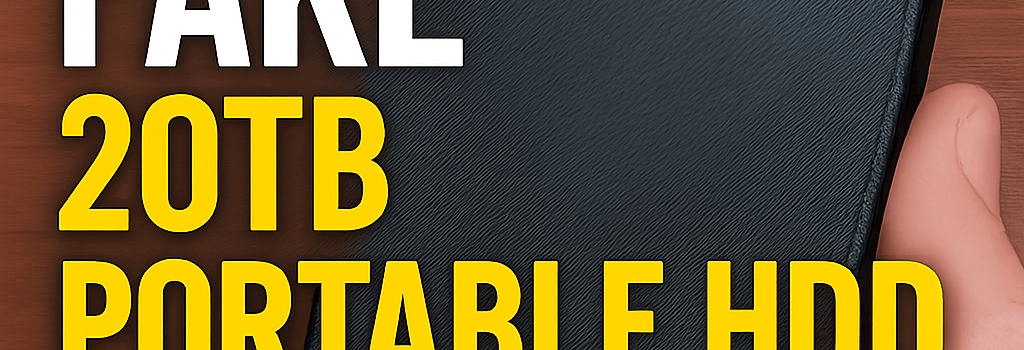The $51 Fake 20TB Portable HDD Exposed

In May 2025, a UK shopper paid £38 (around $51) for what was advertised as a 20TB portable hard disk drive (HDD). After a routine file transfer test, the device failed catastrophically, prompting an internal teardown that revealed nothing more than a hollow plastic enclosure, some wheel weights, and a small PCB housing flash memory. Worse still, the retailer refused a full refund, offering only 30% back plus a “free gift.”
How the Scam Works: Firmware-Level Capacity Tricks
These counterfeit drives exploit the USB Mass Storage Class (MSC) protocol by programming the controller’s firmware to report an inflated capacity. When plugged into Windows, the device mounts as ~19.2 TiB (20 TB by decimal labeling), but any I/O operation stalls or fails. Genuine HDDs negotiate block addresses via SCSI commands; these fakes simply loop failed responses back to the host.
Martin (Reddit username The__Unflushable): “It mounted as ‘Hard Disc’ in Mandarin, I could copy a file name but couldn’t open or format it. Windows Task Manager showed constant high ‘Disk Queue Length’.”
Technical Anatomy of a Fake 20TB HDD
- Enclosure: ABS plastic shell roughly the size of an M.2 SSD, disguised with Toshiba Canvio branding.
- Weighting: 40–60 g of iron wheel weights glued inside to mimic the heft of spinning platters.
- Controller PCB: Often based on an inexpensive Phison PS2251-07 controller, with loosely soldered 3–6 NAND flash packages (typically 128–512GB each).
- Firmware Hack: Custom ID descriptors report 20 000 000 000 000 bytes of capacity, ignoring bad block tables and ECC routines.
Retailer Response and Refund Denial
The site, UK.Chicntech, primarily sells car accessories and home textiles, but has intermittently listed “External high-speed mobile hard disk” at £38. Martin’s father received the Toshiba-branded box with no valid serial number. Despite photographing the internal chassis and PCB, Chicntech support “repeatedly refused to acknowledge the problem,” offering only partial credit.
- Refund request submitted with photos of the empty chassis.
- Support asked for duplicate documentation already provided.
- Final offer: 30% refund, keep the fake device, plus a “free gift” tied to an unrelated Japanese site.
Regulatory and Industry Responses
In March 2025, the UK’s Competition and Markets Authority (CMA) issued a warning under the Digital Services Act requiring online marketplaces to enforce stricter authenticity checks for consumer electronics. Similarly, the Consumer Technology Association (CTA) has published guidelines for retailers to verify serial numbers with manufacturers via automated API calls.
Phison Technology recently released a Firmware Validation Toolkit to help third-party labs detect manipulated descriptors. NIST has also proposed updates to SP 800-101 for mobile storage device validation, emphasizing S.M.A.R.T. attribute auditing and NAND wear-level checks.
Consumer Detection Strategies
- Price Benchmarking: Cross-check against major retailers—20TB external HDDs start at $200–$250; portable SSDs at this capacity exceed $300.
- Manufacturer Verification: Use official software (e.g., Toshiba Storage Diagnostic Tool) to validate serial numbers and firmware revisions.
- S.M.A.R.T. Analysis: Run `smartctl` or CrystalDiskInfo to inspect raw attribute values—unusually low power-on hours and no error logs often indicate fakery.
- Physical Inspection: Weight a genuine drive (often 400–600 g) versus the suspect device (under 100 g plus glued weights).
Additional Expert Insights
“Firmware-level spoofing exploits generic USB controllers that lack device authentication,” says Dr. Emily Zhao, senior researcher at the Cybersecurity and Infrastructure Security Agency (CISA). “Enforcing signed firmware and certificate-based serial validation could curb these scams significantly.”
Security firm Trend Micro’s May 2025 alert noted a 35% uptick in counterfeit storage device listings on lesser-known sites, often leveraging AI-generated product images and descriptions.
What’s Next?
Martin’s father is now disputing the charge with his credit card issuer under Section 75 of the UK Consumer Credit Act. For families relying on tech-savvy relatives, the key takeaways are to stick with authorized dealers, validate specs proactively, and be skeptical of “too-good-to-be-true” storage deals.